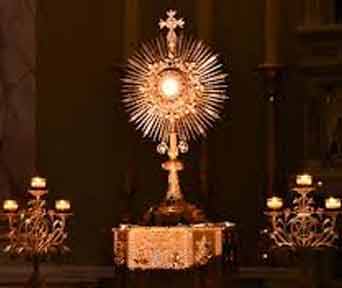Gospel Reflections
Gospel Reflection: Hope Through the Eucharist
19th Sunday of Ordinary Time: The challenges of human life
As human beings we live in a difficult tension. We seem to have one foot on earth and one foot in heaven. As creatures we share many things with the rest of the animals: we have bodies, we eat, we sleep, we have to take care of other bodily, earthly concerns. And yet, we far surpass the rest of creation. We were made with God’s image and likeness, we have will and intelligence. We can think, reason, choose, and love. None of which the animals can do. Squirrels cannot write novels, monkeys cannot do calculus, horses cannot play football (except in Budweiser commercials), and dogs do not have the capacity to aspire for heaven.
 And to make matters worse, all of us live in the world as it suffers the effects of original sin. Not only do we have bodies and earthy concerns, we live in a state of weakness, we are prone to fall morally, we are subject to sickness and death.
And to make matters worse, all of us live in the world as it suffers the effects of original sin. Not only do we have bodies and earthy concerns, we live in a state of weakness, we are prone to fall morally, we are subject to sickness and death.
Very often we get sick of this tension. We get sick of being stuck between earthly and spiritual. Sometimes people just give up and decide to forgo the tension and to live just one side or the other. We have probably all met those people who just give up on the spiritual life. God seems too distant or too difficult to find. Their hearts and minds might have a desire for higher things, but the search seems too difficult or too elusive, so they focus on only those things they can see, sense, feel. They probably don’t go to church, and might look for meaning in earthly instead of spiritual realities.
The story of the “devout” man
The opposite can happen too. Let’s call these people the holy rollers, who live as though they are already in heaven, removed from the ordinariness of the real world. At first, this might seem like a good thing, but consider this story. A woman was sitting next to a man at Mass. The first thing she noticed was how reverently and devoutly the man was participating at Mass. He seemed to be the holiest person in the whole church. In fact, she thought that she started feeling jealous, wishing she were more like this guy. Until the sign of peace. The woman reached over to the holy roller and said peace be with you: the man refused to stretch out his hand and responded coldly: I don’t believe in that garbage… This guy was living like he was already in heaven and forgot something as simple as loving his neighbor.
Christ relieves our tensions
We live in the tension: we are bodily creatures, made with an eternal spiritual soul. We should keep this in mind in our life of faith. Here is one reason why Paul was so masterful. In this week’s second reading hear St. Paul gives his advice to his people. In the first part of the reading, Paul remembers the down to earth side of things:
“All bitterness, fury, anger, shouting, and reviling must be removed from you, along with all malice. And be kind to one another, compassionate, forgiving one another as God has forgiven you in Christ”.
So Paul meets us in the ordinariness of our lives: put away evil things and be kind and compassionate. Paul doesn’t stay on just earthly things: “be imitators of God”, he says next. Paul has a marvelous way to meet us where we are, but it would certainly be a sad thing if we just remained where we are. Rather, we were made for nothing less than communion with God. We certainly have down to earth concerns, but our goal is eternal life in the kingdom of God.
Finding hope in the Holy Eucharist
 But this model is not unique to Paul. Rather, it comes from Jesus: “I am the bread that came down from heaven”. But Jesus did not come among us to leave us here: I am the bread of life whoever eats this bread will live forever. Jesus did not forget our down to earth concerns, he came as one like us in all things but sin, but he came to bring back to the Father.
But this model is not unique to Paul. Rather, it comes from Jesus: “I am the bread that came down from heaven”. But Jesus did not come among us to leave us here: I am the bread of life whoever eats this bread will live forever. Jesus did not forget our down to earth concerns, he came as one like us in all things but sin, but he came to bring back to the Father.
Again, the Eucharist is a sacrament that deals well with the tension of human life. It comes to us in a very down to earth way: it comes to us in the form of bread and wine. But we certainly know that it is very much more than that. It is the bread of life, is the Lamb of God who takes away the sin of the world. The tension of human life can be difficult on us, we might be tempted to give up on the tension, but with the gift of the Eucharist we find the strength we need to walk this difficult journey.
About the Author
Father Jake Runyon is a priest in the Diocese of Fort Wayne-South Bend where he serves as the Rector and Pastor of the Cathedral of the Immaculate Conception in Fort Wayne. This post was originally published on his personal blog Docete and is shared here with permission.
